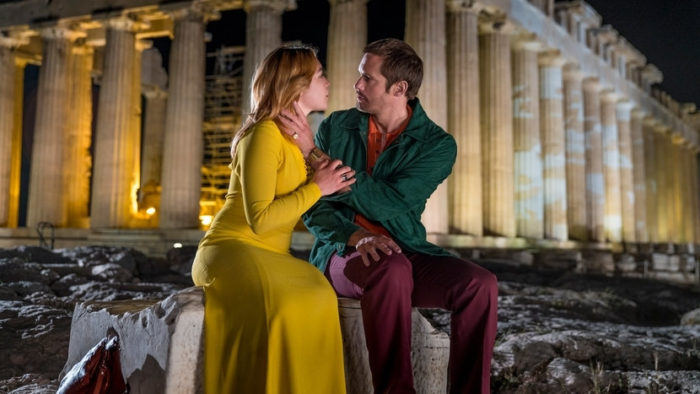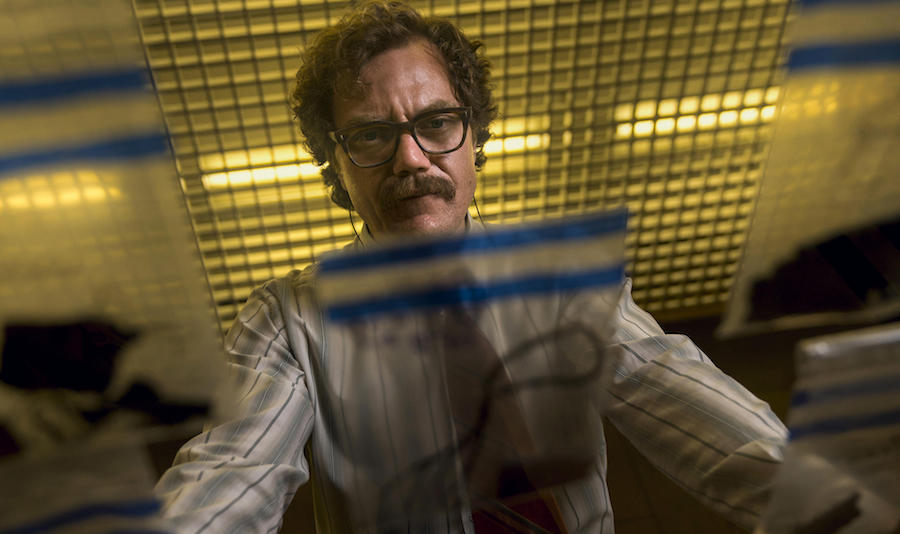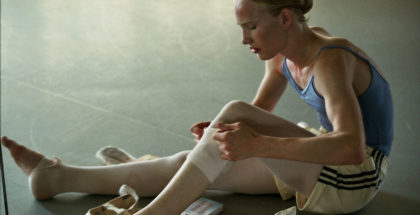UK TV review: The Little Drummer Girl
Review Overview
Cast
8Direction
8Intrigue
8David Farnor | On 18, Oct 2018
“We’re putting on a production…” says Marty Kurtz (Michael Shannon) to young actress Charlie (Florence Pugh) at the start of The Little Drummer Girl. He proceeds to offer her a part in a show that promises intrigue, style and unpredictable shocks – it’s no coincidence that he could easily be talking about the TV series itself. Since AMC and BBC One partnered on The Night Manager, expectations have been high for their next John le Carré adaptation, and The Little Drummer Girl doesn’t disappoint.
After that success, this new take on the spy writer’s espionage hijinks is a decidedly knowing affair: it’s a performance about performers putting on performers, who may or may not be performing for each other in between. When we meet Marty, the Israeli agent selects carefully from a suitcase of sunglasses to complete the part he’s playing today, just as Charlie adapts the way she behaves to fit her audience – whether it’s a pub theatre crowd or the enigmatic suitor Becker (Alexander Skarsgard), who approaches her on a sunny Greek beach.
It’s a perfect fit for Park Chan-wook, one of the directors you might least expect to find on a BBC programme. Fresh from The Handmaiden, he’s a filmmaker who’s in his element here, playing with appearances and costumes with an infectious electricity; every new change of clothes (and there are many) comes with a frisson of excitement and a spark of tension, and every item of furniture in every stunningly designed interior becomes a foregrounded object that anchors and entraps these players, strutting their artifice on an ever-shifting stage. There are six episodes in this whole series, and you can feel the Oldboy director stretching out into every available minute of those lengthy runtimes to indulge in the 1970s atmosphere, filling up the frame with eye-popping primary colours.
But it’s not just about slick surface: the opening set piece loudly grabs your attention, with a ticking soundtrack that sets your pulse racing. What follows is a decidedly slow-burn thriller, but one that’s no less gripping; it’s not until the credits roll on the first hour that you realise how much screenwriters Michael Lesslie (Justin Kurzels’ Macbeth) and Claire Wilson (Partners in Crime) have sunk their claws into you. They take their time to lay out the complex politics that drive events; Marty and co are Mossad terrorists looking to capture Palestinian bomber Khalil, who strikes with the help of a distractingly attractive (for any eyewitnesses) young woman (and a signature wire doll left in the casing), and so they enlist their own young woman to slip past enemy spies unnoticed. Her own secrets, though, mean that Charlie isn’t quite the pawn they expect, and her own political views aren’t necessarily as advertised.
Florence Pugh sinks her teeth into a role that is far meatier than it could have been in another show’s hands. Pugh is enjoying a meteoric rise that’s much deserved, with turns in Netflix’s Outlaw King and BBC’s King Lear following her breakout performances in Lady Macbeth and ITV’s Marcella. She’s sensational here, bursting with bite and confidence, smarts and deceit, all wrapped up in a bundle of amusing sarcasm and sincere caution at what she’s being roped into. Can she take on a role and improvise 24/7 as she goes undercover? And is that changed by the presence of Skarsgard’s Becker, a swoonsome, enigmatic figure who carries himself with an intimidating poise?
All these elements come together under the watchful gaze of Marty, played by Shannon with a charming eccentricity and a disturbing determination. He’s part spymaster, part detective, as he pieces together the aftermath of a bombing and tracks down the culprit – he could almost be the lead character, were it not for Pugh’s likeable window into this world, a window that comes with a modern lens of awareness of outdated gender tropes. “The good news is I’ve lied to you as little as possible,” Marty tells Charlie, in a crucial conversation. But as she’s asked to pretend to be Becker’s other half, and as Marty ingeniously concocts a fake prison cell in the middle of an apartment owned by a Miss Bach (Clare Holman, having a whale of a time), it soon becomes impossible to tell which parts of this charade are real – and that’s only within the first two hours.
The labyrinth only gets more complex as the remaining four instalments unfold, and that winding, reflecting spiral is carefully meted out with set pieces to keep up the suspense; Charlie driving a car stuffed with explosives into Austria is nail-biting, as it’s contrasted with Marty and Becker trying to solve problems behind the scenes, while a later mission that puts in the middle of a Lebanon training camp works precisely because we don’t get that background worry and concern – the deeper her cover gets, the more she’s on her own. It’s these moments that really bring into the focus the heart of the thriller: Pugh’s Charlie, trying to grapple with who she is and what she believes. We see her change effortlessly to fit in with others, from cosying up to revolutionary soldier Salim to befriending his sister, Fatmeh, and, finally, earning the trust of Salim’s brother, our Big Bad, Khalil (Charif Ghattas).
By the time we’re watching Khalil assemble one of his wire dolls first-hand, our perspective of him has changed, as we’ve seen (through Charlie) a softer side than the one related to us via his enemy, Marty – in contrast to its clearly defined primary-colour blocking, this whole show is a spinning hall of mirrors, with each side of a divisive political conflict coming with its own shades, nuances, zeal and aspects of humanity. Nonetheless, there’s a tension between those of identity and those of another. “When the dust settles, I don’t want a whiff of you or your kind,” English agent Picton (a scene-stealing Charles Dance) barks at Marty, as they plot a mission in London, even more irksome to the Brit as Kurtz is using a young London actress to do it. Equally annoyed about her position is Becker, whose romantic connection to her leads him to bristle at the idea that she might be stuck living out her fake persona forever.
And yet, after all this deceit and manoeuvring, Park Chan-wook’s thriller concludes with the muted suggestion that perhaps neither of them have a sense of self anymore. “I’m just an actress,” she says at one point. “So you don’t believe in anything?” comes the cynical response. And yet, in this game, that’s the only thing there is to cling to: even when a crucial set piece is staged to look like it’s gone down in a certain way, and even when she’s behind closed doors out of public view, Charlie is ordered to “play the scene”, so that in her head, there’s some element of truth to the conversation she’ll later recite.
It is, as Shannon’s de facto director declared at the outset, a production, and he isn’t kidding: this ambitious project is a sumptuous piece of television packaged with an irresistible number of layers. Get ready to be hooked: this is about to become your new Sunday night obsession.



















